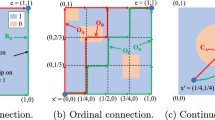Abstract
We propose a fast, model agnostic method for finding interpretable counterfactual explanations of classifier predictions by using class prototypes. We show that class prototypes, obtained using either an encoder or through class specific k-d trees, significantly speed up the search for counterfactual instances and result in more interpretable explanations. We quantitatively evaluate interpretability of the generated counterfactuals to illustrate the effectiveness of our method on an image and tabular dataset, respectively MNIST and Breast Cancer Wisconsin (Diagnostic). Additionally, we propose a principled approach to handle categorical variables and illustrate our method on the Adult (Census) dataset. Our method also eliminates the computational bottleneck that arises because of numerical gradient evaluation for black box models.
Access this chapter
Tax calculation will be finalised at checkout
Purchases are for personal use only
Similar content being viewed by others
References
Banerjee, A., Merugu, S., Dhillon, I.S., Ghosh, J.: Clustering with Bregman divergences. J. Mach. Learn. Res. 6, 1705–1749 (2005)
Beck, A., Teboulle, M.: A fast iterative shrinkage-thresholding algorithm for linear inverse problems. SIAM J. Imag. Sci. 2(1), 183–202 (2009). https://doi.org/10.1137/080716542
Bentley, J.L.: Multidimensional binary search trees used for associative searching. Commun. ACM 18(9), 509–517 (1975). https://doi.org/10.1145/361002.361007
Bien, J., Tibshirani, R.: Prototype selection for interpretable classification. Ann. Appl. Stat. 5(4), 2403–2424 (2011). https://doi.org/10.1214/11-AOAS495
Borg, I., Groenen, P.: Modern Multidimensional Scaling: Theory and Applications. Springer, New York (2005). https://doi.org/10.1007/0-387-28981-X
Cost, S., Salzberg, S.: A weighted nearest neighbor algorithm for learning with symbolic features. Mach. Learn. 10(1), 57–78 (1993). https://doi.org/10.1023/A:1022664626993
Dhurandhar, A., et al.: Explanations based on the missing: towards contrastive explanations with pertinent negatives. Adv. Neural. Inf. Process. Syst. 31, 592–603 (2018)
Dhurandhar, A., Iyengar, V., Luss, R., Shanmugam, K.: Tip: typifying the interpretability of procedures. arXiv preprint arXiv:1706.02952 (2017)
Dhurandhar, A., Pedapati, T., Balakrishnan, A., Chen, P.Y., Shanmugam, K., Puri, R.: Model agnostic contrastive explanations for structured data. arXiv preprint arXiv:1906.00117 (2019)
Dua, D., Graff, C.: UCI machine learning repository (2017)
Gurumoorthy, K.S., Dhurandhar, A., Cecchi, G.: Protodash: fast interpretable prototype selection. arXiv preprint arXiv:1707.01212 (2017)
Jiang, H., Kim, B., Guan, M., Gupta, M.: To trust or not to trust a classifier. Adv. Neural. Inf. Process. Syst. 31, 5541–5552 (2018)
Kaufmann, L., Rousseeuw, P.: Clustering by means of medoids. Data Analysis based on the L1-Norm and Related Methods, pp. 405–416 (1987)
Kim, B., Khanna, R., Koyejo, O.O.: Examples are not enough, learn to criticize! criticism for interpretability. Adv. Neural. Inf. Process. Syst. 29, 2280–2288 (2016)
Laugel, T., Lesot, M.-J., Marsala, C., Renard, X., Detyniecki, M.: Comparison-based inverse classification for interpretability in machine learning. In: Medina, J., et al. (eds.) IPMU 2018. CCIS, vol. 853, pp. 100–111. Springer, Cham (2018). https://doi.org/10.1007/978-3-319-91473-2_9
Le, S.Q., Ho, T.B.: An association-based dissimilarity measure for categorical data. Pattern Recogn. Lett. 26(16), 2549–2557 (2005). https://doi.org/10.1016/j.patrec.2005.06.002
LeCun, Y., Cortes, C.: MNIST handwritten digit database (2010)
Lim, J.N., Yamada, M., Schölkopf, B., Jitkrittum, W.: Kernel stein tests for multiple model comparison. In: Advances in Neural Information Processing Systems 32, pp. 2240–2250. Curran Associates, Inc. (2019)
Lundberg, S.M., Lee, S.I.: A unified approach to interpreting model predictions. Adv. Neural. Inf. Process. Syst. 30, 4765–4774 (2017)
Luss, R., Chen, P.Y., Dhurandhar, A., Sattigeri, P., Shanmugam, K., Tu, C.C.: Generating contrastive explanations with monotonic attribute functions. arXiv preprint arXiv:1905.12698 (2019)
Molnar, C.: Interpretable Machine Learning (2019). https://christophm.github.io/interpretable-ml-book/. Accessed 22 Jan 2020
Mothilal, R.K., Sharma, A., Tan, C.: Explaining machine learning classifiers through diverse counterfactual explanations. In: Proceedings of the 2020 Conference on Fairness, Accountability, and Transparency (2020). https://doi.org/10.1145/3351095.3372850
Ribeiro, M.T., Singh, S., Guestrin, C.: “Why should I trust you”: explaining the predictions of any classifier. In: Proceedings of the 22Nd ACM SIGKDD International Conference on Knowledge Discovery and Data Mining, pp. 1135–1144 (2016). https://doi.org/10.1145/2939672.2939778
Rumelhart, D.E., Hinton, G.E., Williams, R.J.: Learning internal representations by error propagation. In: Parallel Distributed Processing: Explorations in the Microstructure of Cognition, vol. 1, pp. 318–362. MIT Press, Cambridge (1986)
Snell, J., Swersky, K., Zemel, R.: Prototypical networks for few-shot learning. Adv. Neural. Inf. Process. Syst. 30, 4077–4087 (2017)
Takigawa, I., Kudo, M., Nakamura, A.: Convex sets as prototypes for classifying patterns. Eng. Appl. Artif. Intell. 22(1), 101–108 (2009). https://doi.org/10.1016/j.engappai.2008.05.012
Wachter, S., Mittelstadt, B., Russell, C.: Counterfactual explanations without opening the black box: automated decisions and the GDPR. Harvard J. Law Technol. 31, 841–887 (2018)
Zou, H., Hastie, T.: Regularization and variable selection via the elastic net. J. Roy. Stat. Soc. Ser. B (Stat. Methodol.) 67(2), 301–320 (2005)
Author information
Authors and Affiliations
Corresponding author
Editor information
Editors and Affiliations
1 Electronic supplementary material
Below is the link to the electronic supplementary material.
Rights and permissions
Copyright information
© 2021 Springer Nature Switzerland AG
About this paper
Cite this paper
Van Looveren, A., Klaise, J. (2021). Interpretable Counterfactual Explanations Guided by Prototypes. In: Oliver, N., Pérez-Cruz, F., Kramer, S., Read, J., Lozano, J.A. (eds) Machine Learning and Knowledge Discovery in Databases. Research Track. ECML PKDD 2021. Lecture Notes in Computer Science(), vol 12976. Springer, Cham. https://doi.org/10.1007/978-3-030-86520-7_40
Download citation
DOI: https://doi.org/10.1007/978-3-030-86520-7_40
Published:
Publisher Name: Springer, Cham
Print ISBN: 978-3-030-86519-1
Online ISBN: 978-3-030-86520-7
eBook Packages: Computer ScienceComputer Science (R0)





